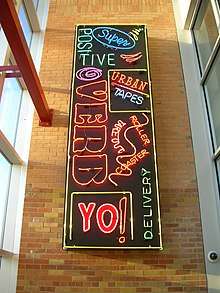CaptionMax
CaptionMax[1] is one of North America's largest closed captioning and media accessibility companies. The company is headquartered in Minneapolis, Minnesota, with additional locations in New York City, New York and Burbank, California. The company provides captions, subtitles, translation, video description, and as-broadcast scripts for over 450 customers including all major broadcast and cable TV networks, production companies, studios, distributors, educational institutions, government agencies, large corporations and Internet portals. Some clients include Warner Bros. Television (CW network productions), NBCUniversal (network productions), McGraw-Hill, Viacom Media Networks and Sony Pictures Entertainment.
 | |
| Industry | Media Accessibility |
|---|---|
| Founded | 1992 |
| Founder | Max Duckler |
| Headquarters | Minneapolis, Minnesota , |
| Products | Closed Captioning |
| Website | www |
History
Captionmax is a privately owned business. The company was founded in 1992 by Max Duckler. In the last 25 years, Captionmax has expanded from a small, one person shop to a company of over 100 employees and independent contractors working on a variety of accessible media services. Today, Captionmax owns buildings in both Minneapolis, MN and Glendale, CA.
- 1993 - Captionmax gets its first captioning contract from Hazelden.
- 1995 - Captionmax partners with DCMP.[2]
- 1996 - Captionmax wins its first cooperative agreement award to caption syndicated programming such as Hometime and Dukes of Hazzard[3].
- 1997 - Captionmax hosts its first Consumer Advisory Board Meeting.
- 2003 - Captionmax Video Description Department is added in-house.
- 2004 - Captionmax builds a new 13,500 square feet (1,250 m2) facility in Burbank. The facility houses satellites, realtime operations, and the largest offline captioning staff in California.
- 2006 - Captionmax is awarded 2 5-year Access to Emerging Technologies grants[4] from the U.S. Department of Education.
- 2007 - Captionmax builds a new 25,000 square feet (2,300 m2) LEED certified headquarters in Minneapolis, MN.
- 2007 - Captionmax partners with the National Association of the Deaf to increase accessible media in the classroom.[5]
- 2008 - Captionmax collaborated with NCSeT to research video description.[6]
- 2009 - Captionmax partners with Discovery Education under a U.S. Department of Education grant to increase accessibility to educational media used in K-12 classrooms.
- 2010 - Captionmax awarded $2.5 million grant to provide video description.[7]
- 2017 - Captionmax's leadership team led a management buyout
- 2018 - Captionmax received the "Eye on Impact" Award from CBS.[8]
Partnerships
In 2006 Captionmax entered the educational multimedia market.
Captionmax authors hundreds of hours of accessible interactive educational materials used in K-12 classrooms across the country. This media contains enhancements, such as video description and captioned glossary terms, to help children on comprehension tests.
For the past 15 years, Captionmax has hosted a Consumer Advisory Board Meeting attended by Captionmax staff, business professionals in the accessibility world, teachers, and students.
Captionmax also partners with DCMP[9] to provide closed captions, subtitles, and video description to their library.
Research and development
In 2006, Captionmax was awarded 2 5-year Access to Emerging Technologies grants from the U.S. Department of Education. These grants enabled Captionmax to participate in research and development with other organizations, such as DCMP and Cued Speech Discovery and Information Services.[10]
In 2008, Captionmax collaborated with the National Center for Supported eText (NCSeT) in an initiative called The Supportive Video Project. The goal of this collaboration was to research enhanced video description options for educational learning.
See also
References
- "Accessibility Services at CaptionMax". www.captionmax.com. Archived from the original on 27 September 2009. Retrieved 27 February 2012.
- "Captioning for DCMP: One Agency's Perspective" (PDF). Retrieved 27 February 2012.
- "Waa-hee! Takin' federal funds for a ride". www.bizjournals.com. Retrieved 2019-06-14.
- "2006 ANNUAL REPORT TO CONGRESS". U.S. Department of Education. Archived from the original on 9 December 2012. Retrieved 27 February 2012.
- "NAD and CaptionMax Cooperate to Provide More Captioned Media". Archived from the original on 17 December 2011. Retrieved 13 February 2012.
- "2008 NCTI Technology in the Works Abstract: Supported Video Project - Making Video Content Accessible to Al" (PDF). Retrieved 2 February 2012.
- "Coalition of Organizations for Accessible Technology". Archived from the original on 14 April 2013. Retrieved 13 February 2012.
- "Captionmax Awarded 'Eye on Impact' Award From CBS". www.newswire.com. Retrieved 2020-04-07.
- "The Described and Captioned Media Program and Emerging Technologies" (PDF). Retrieved 2 February 2012.
- "What I Should Have Known About Captioning" (PDF). Retrieved 28 February 2012.
Psychology. (n.d.). In Wikipedia. Retrieved October 14, 2009, from https://assist-ny.com/Closed-Captioning-Services-New-York.php